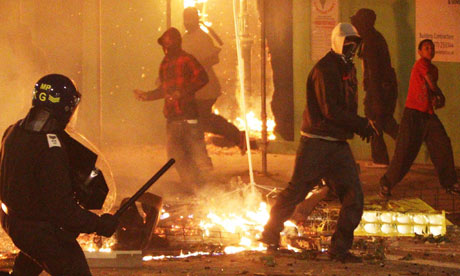 |
| Riot police patrol the streets in Tottenham during the August 2011 riots. Photograph: Lewis Whyld/PA |
Slogans and stickers will not help the area recover. Calls for justice must be heard – otherwise we'll see a repeat of the riots
Along Tottenham High Road you cannot help but notice the "I Love Tottenham" stickers emblazoned on every lamppost and in nearly every shop. This is a local-authority-conceived campaign, one that it hopes will bolster community, consumer and investor confidence in the area. As someone who genuinely does love Tottenham I do not wish to undermine the initiative, but it's impossible not to question the goals of the campaign when the logo gives no insight into why I, or anyone else, should believe in this particular area.
What does "I love Tottenham" mean to those people who took part in the events of 7 August, which followed the shooting of Mark Duggan by the police? Do they love Tottenham? Well they might do, if you can love somewhere and hate it at the same time.
For most of those I know who took part, Tottenham is the only home they've ever had; some of them have never strayed far from its borders. Far too many have never been outside London. For them it's where they feel most at ease. But for many it is also a prison. They were born on Tottenham's estates, and see little chance of escaping. These estates can be desperate places to live.
I doubt that the "I Love Tottenham" merchandise will make its way on to the estates in any meaningful way. For the residents know this is yet another cosmetic exercise, similar to the spending of £30m on the Broadwater Farm estate in the 1990s. It's designed to make those who are passing through think that change has occurred when really nothing could be further from the truth. Haringey council and Tottenham's MP David Lammy have done some good work supporting those who have lost their homes and businesses: for this they should be applauded. But they have shied away from engaging with those whose actions placed Tottenham in the media spotlight once again.
It's a reminder of how different it all was in 1985, when Bernie Grant was the leader of Haringey council. Instead of giving the kneejerk reactions we have seen from today's politicians, he sought to provide a different perspective: he spoke to us before speaking to the media, but most importantly he didn't say one thing off camera and another thing on camera. That's why there were no more riots in Tottenham – even after the killings of Joy Gardner in 1993 and Roger Sylvester in 1999 – while Grant was our MP. There was a feeling that someone in authority cared and would represent their views. Those I speak with today feel no one is remotely interested in hearing their stories, much less willing to represent them.
Those who are able to speak about the real reasons Tottenham was set ablaze are now finding themselves ignored by the local authority. One well-known reverend, who used to virtually eat, drink and sleep with the council, is no longer invited into the same room after he had the temerity to state publicly that he believed an injustice was being done. The local authority should be listening to him: he has had a glimpse into the lives of those blighted by their policies.
These actions only add to the sense of isolation and marginalisation that some in Tottenham's black community have endured for decades. It seems that these politicians have learned little from the expensive public inquiries that they paid for, such as Scarman, Gifford and Macpherson.
Lammy has told me that Grant's stance saw Tottenham ostracised by the politicians; but Tottenham had been forgotten long before Bernie became our MP. While he may not have brought the ministerial visits we have seen recently, Lammy shouldn't think he himself brought them here either: the riots did. And Grant brought us something much more profound than ministers: he brought us hope, gave us pride, and provided us with leadership.
Martin Luther King once said that riots gave a voice to the voiceless; but the voices of those who felt moved to take to the streets in August are still very much unheard. The lessons from the 80s should tell us that ignoring them will come at a cost.
These people are the "already marginalised", or the offspring of the "already marginalised": the ones who were excluded from school in disproportionate numbers; who were arrested and convicted under "sus" laws in disproportionate numbers; who are being stopped and searched in disproportionate numbers. They see themselves as victims too: to further marginalise them will only make them feel squeezed between a rock and an even harder place. As far as they are concerned, they are being left with no alternative but to lash out. So telling them that sentences are going to increase is akin to telling someone strapped with a bomb, "Stop or I'll shoot!"
I love Tottenham, but it's the people that make it lovable, not slogans. It will need much more than a sticker campaign if we are to ensure that none of this plays out on our streets again.
Equality, fairness and justice must be on the table, for without this the regeneration of Tottenham High Road will be meaningless to many of its inhabitants, and the likelihood of another riot erupting will remain a distinct possibility.
By Stafford Scott

(First published at: The Guardian www.guardian.co.uk)
